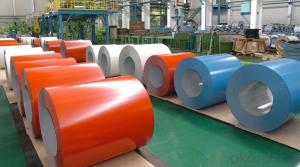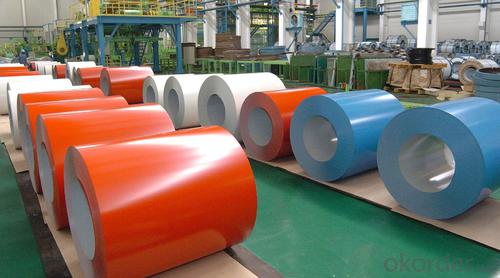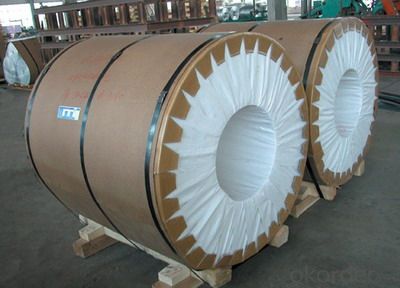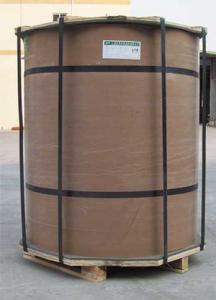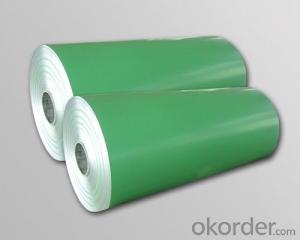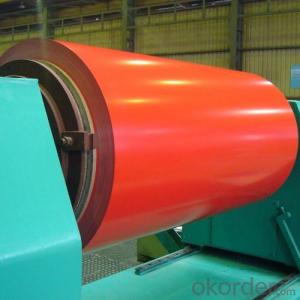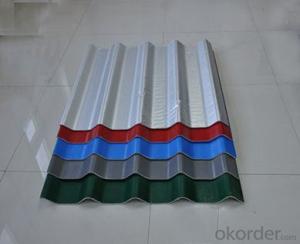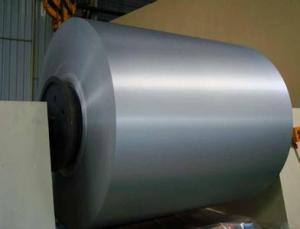Aluminum Roof Coil - Coated Aluminum Coils AA3XXX
- Loading Port:
- China Main Port
- Payment Terms:
- TT or LC
- Min Order Qty:
- 5 m.t.
- Supply Capability:
- 100000 m.t./month
OKorder Service Pledge
OKorder Financial Service
You Might Also Like
1.Structure of Coated Aluminum Coils AA3xxx Description
Coated Aluminum Coils AA3xxx are of a wide range of colors, which give wonderful appearance no matter in residential and commercial constructions or great exhibition centers.
Coated Aluminum Coils AA3xxx have been widely used in the fields of construction and decoration, electronic applications, lighting decoration, air-condition air pipes, sandwich panels and drainages etc.
2.Main Features of the Coated Aluminum Coils AA3xxx
• Superior quality of raw material
• Reasonable and stable chemical composition
• Accurate tolerance
• Goode mechanical property
3.Coated Aluminum Coils AA3xxx Images
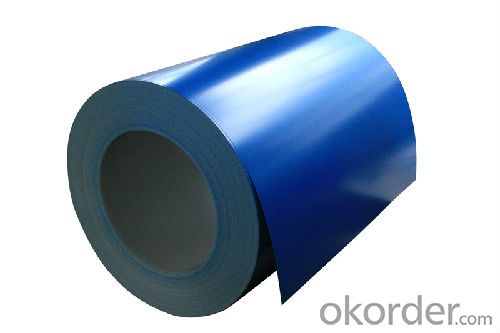
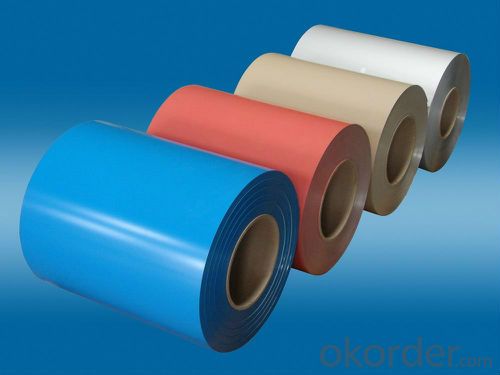
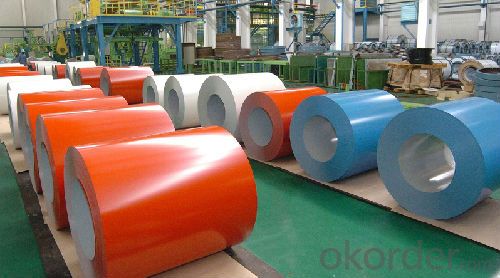
4.Coated Aluminum Coils AA3xxx Specification
Alloy | AA3xxx (AA3003,AA3105 etc.) |
Temper | H14, H16, H18, H22, H24, H26 |
Thickness | 0.2-4mm |
Width | 800-1900mm |
Standard | GB/T 3880-2006,EN,ASTM,JIS |
5. FAQ of Aluminum Sheets 1xxx C.C Quality
A. What is the delivery time?
Within 35 days after receiving original L/C or advanced payment.
B. What is the package?
On wooden pallets in containers.
- Q: What are the rules or laws governing the use of aluminum coils?
- <p>Yes, there are regulations on the use of aluminum coils, which vary by country and industry. These regulations often pertain to safety, quality standards, and environmental impact. For instance, in the construction industry, aluminum coils used for roofing or cladding must meet specific standards for strength and durability. In food packaging, regulations may dictate the type of aluminum alloys used to prevent contamination. Additionally, there are environmental regulations that govern the disposal and recycling of aluminum coils to minimize their impact on the environment. Compliance with these regulations is crucial for manufacturers, suppliers, and users of aluminum coils to avoid legal penalties and ensure public safety.</p>
- Q: Is it possible to utilize steel wires in the creation of jewelry or decorative items?
- <p>Yes, you can use steel wires for making jewelry or decorations. Steel wires are durable and can be shaped into various forms, making them suitable for a range of designs. They are often used in wire wrapping techniques and can be combined with beads or other materials. However, it's important to consider the type of steel used; stainless steel is more resistant to rust and is commonly preferred for jewelry making. Additionally, steel wires may require special tools for cutting and bending, and proper safety measures should be taken during the crafting process.</p>
- Q: Is it safe and practical to use aluminum coils in cooking processes?
- <p>Aluminum coils can be used for cooking, but with certain precautions. They are commonly used in commercial kitchens for their heat conductivity and durability. However, for home cooking, it's important to avoid acidic or alkaline foods, as aluminum can react with them. Additionally, prolonged exposure to heat can cause aluminum to leach into food, which some studies suggest may have health implications. It's advisable to use aluminum cookware with a protective coating or opt for alternative materials like stainless steel or cast iron for health-conscious cooking.</p>
- Q: What are the compositions of aluminum coil coating?
- Resin, pigment, auxiliary and solvent.
- Q: How are aluminum coils tested for strength and durability?
- Strength and durability of aluminum coils are tested thoroughly using multiple methods. One of these methods is tensile testing, which determines the maximum stress a coil can endure before breaking or deforming. This test assesses the overall strength and elasticity of the aluminum. Another crucial test is the hardness test, which measures the aluminum coil's resistance to indentation or scratching. It helps determine the material's durability and ability to resist wear. Moreover, fatigue testing is commonly performed on aluminum coils by repeatedly subjecting them to cyclic loading and unloading. This test simulates real-life conditions and evaluates the coil's ability to withstand repeated stress without failing. Additionally, corrosion resistance plays a vital role in determining the durability of aluminum coils. Therefore, various corrosion tests, including salt spray testing, are conducted to evaluate the coil's resistance to environmental factors that could cause corrosion or degradation over time. In certain cases, non-destructive testing methods like ultrasonic testing or eddy current testing are utilized to detect any internal defects or inconsistencies within the coil that may impact its strength and durability. Overall, a combination of mechanical, physical, and chemical tests are carried out on aluminum coils to ensure they meet the required standards for strength and durability. These tests instill confidence in manufacturers and consumers regarding the quality and reliability of aluminum coils for various applications.
- Q: This question asks for a comparison of the benefits and drawbacks associated with using aluminum coil.
- <p>Aluminum coil offers several advantages such as high strength-to-weight ratio, corrosion resistance, and excellent thermal and electrical conductivity. It is also cost-effective and easy to form, making it ideal for various applications like construction, automotive, and electrical industries. However, it has some disadvantages, including lower strength compared to steel, potential for galvanic corrosion when in contact with dissimilar metals, and a higher likelihood of denting or denting. Additionally, aluminum's recycling process can be energy-intensive, which may impact its environmental sustainability.</p>
- Q: How do aluminum coils compare to other materials in terms of strength?
- Aluminum coils are known for their excellent strength-to-weight ratio, making them highly competitive compared to other materials. While materials like steel or copper may have higher absolute strength, aluminum coils offer comparable strength with significantly lighter weight, making them ideal for various applications where weight reduction is crucial.
- Q: This question asks for a brief explanation of the process involved in the manufacturing of aluminum coils.
- <p>Aluminum coil is made through a series of processes starting with the melting of aluminum ingots or scrap. The molten aluminum is then poured into a casting machine where it's cooled and solidified into large slabs. These slabs are then heated and passed through a series of rolling mills to reduce their thickness and achieve the desired coil gauge. The rolling process is often hot or cold, depending on the final application of the coil. After rolling, the aluminum is coiled into rolls and may undergo additional treatments like annealing to improve its properties. Finally, the aluminum coil is cleaned, inspected, and shipped for use in various industries such as construction, automotive, and packaging.</p>
- Q: Aluminum is directly below Mg. If aluminum is oxidized so readily, then how can we make planes or ships out of it and they don't fall apart after a few months or years?
- Yes aluminum does oxidize just like any other metal. The difference is that aluminum oxidizes the same color as the metal therefore you cannot tell that is oxidizing. Once is oxidizes a little bit, the oxidize protects the metal and it does not oxidize any more.
- Q: Hi i need to know what will happen to the impact strength of aluminum 2024 reinforced with Silicon carbide is treated to cryogenic temperature (nearly -200C). Will impact strength increase or decrease. Also will the impact strength vary with respect to the percentage of Silicon carbide.
- Aluminum 2024 doesn't have a transition temperature, it absorbs about 18n-m impact strength (via charpy tests I ran three weeks ago at my College course). This was constant between -150?C to +150°C (liquid nitrogen to a furnace). This excerpt from wiki: Cutting tools In 1982 at the Oak Ridge National Laboratories, George Wei, Terry Tiegs, and Paul Becher discovered a composite of aluminium oxide and silicon carbide whiskers. This material proved to be exceptionally strong. Development of this laboratory-produced composite to a commercial product took only three years. In 1985, the first commercial cutting tools made from this alumina and silicon carbide whisker-reinforced composite were introduced by the Advanced Composite Materials Corporation (ACMC) and Greenleaf Corporation. Leads me to believe it depends on how you mix the material in would make a difference. Silicon Carbide and aluminum make very strong tools, but would make it more brittle. The ceramic in a metallic crystal lattice (metal is a crystalline structure) would allow more voids to coalesce leading to a brittle fracture, but the initial strength would be improved because of substitution dislocations in the crystal structure (it would be more rigid, stronger, but more prone to sudden failure). Silicon carbide has low thermal expansion coefficient compared to aluminum also so when it gets really cold the aluminum would contract around the particles increasing the strength, but again, reducing ductility and causing fractures to occur more rapidly. Anyways, very interesting, you should do a bit of research on your own after this as I gave you some good places to work from (and I'm sure plenty of words to look up ;D )
Send your message to us
Aluminum Roof Coil - Coated Aluminum Coils AA3XXX
- Loading Port:
- China Main Port
- Payment Terms:
- TT or LC
- Min Order Qty:
- 5 m.t.
- Supply Capability:
- 100000 m.t./month
OKorder Service Pledge
OKorder Financial Service
Similar products
Hot products
Hot Searches
Related keywords
